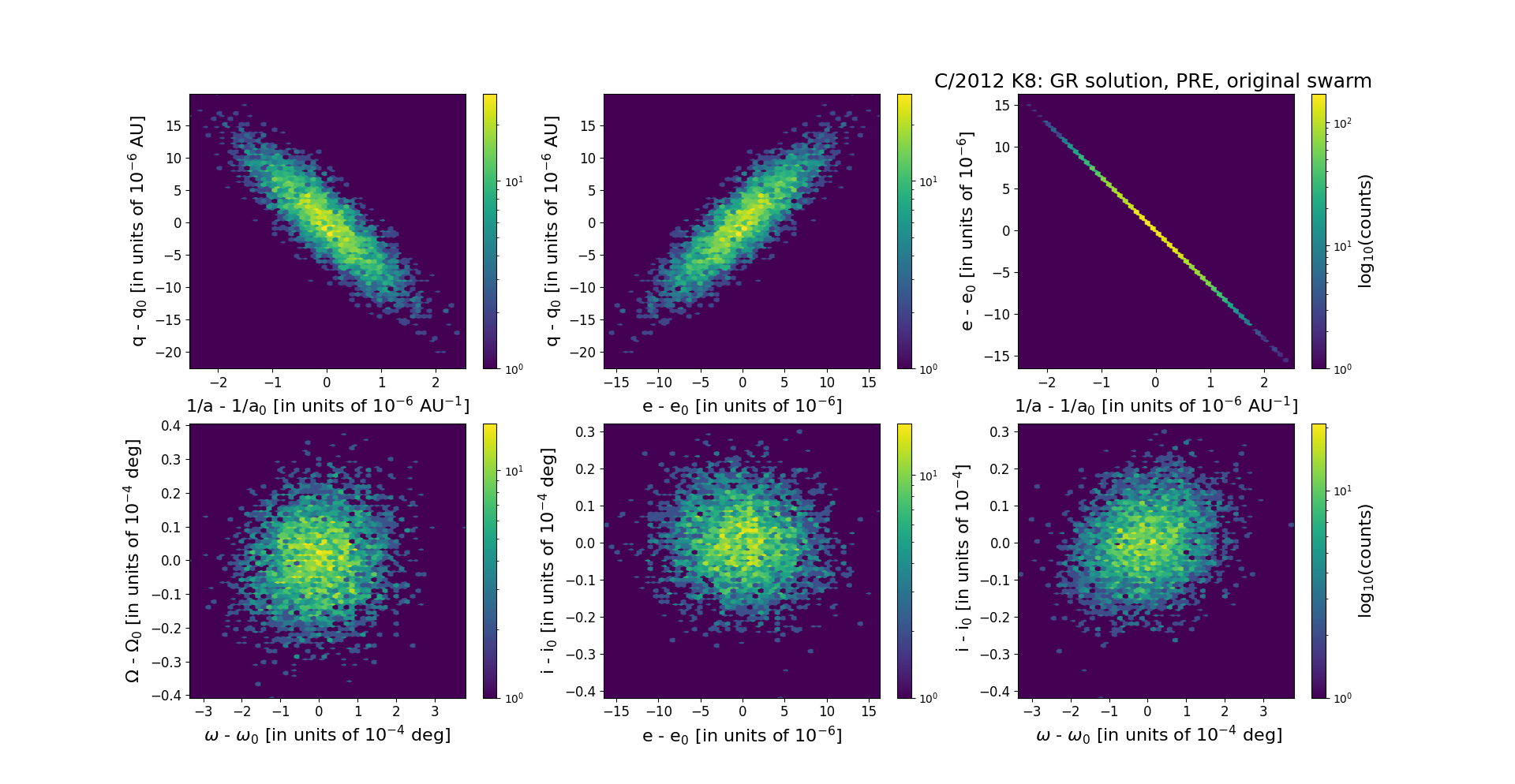C/2012 K8 Lemmon
more info
Comet C/2012 K8 was discovered on 30 May 2012 with Mount Lemmon survey, that is about 2.2 years before its perihelion passage. It was observed during five oppositions until 8 June 2016.
Comet had its closest approach to the Earth on 21 June 2014 (6.120 au), about 2 months before perihelion passage.
Solutions given here are based on data spanning over 4.02 yr in a range of heliocentric distances: 8.40 au – 6.463 au (perihelion) – 7.81 au.
This Oort spike comet suffers very tiny planetary perturbations during its passage through the planetary system and in the next perihelion passage it will be an Oort spike comet.
See also Królikowska and Dones 2023.
Comet had its closest approach to the Earth on 21 June 2014 (6.120 au), about 2 months before perihelion passage.
Solutions given here are based on data spanning over 4.02 yr in a range of heliocentric distances: 8.40 au – 6.463 au (perihelion) – 7.81 au.
This Oort spike comet suffers very tiny planetary perturbations during its passage through the planetary system and in the next perihelion passage it will be an Oort spike comet.
See also Królikowska and Dones 2023.
| solution description | ||
|---|---|---|
| number of observations | 668 | |
| data interval | 2012 05 30 – 2014 08 17 | |
| data arc selection | data generally limited to pre-perihelion (PRE) | |
| range of heliocentric distances | 8.4 au – 6.46au | |
| detectability of NG effects in the comet's motion | NG effects not determinable | |
| type of model of motion | GR - gravitational orbit | |
| data weighting | YES | |
| number of residuals | 1288 | |
| RMS [arcseconds] | 0.43 | |
| orbit quality class | 1a+ | |
| orbital elements (barycentric ecliptic J2000) | ||
|---|---|---|
| Epoch | 1706 07 17 | |
| perihelion date | 2014 08 19.69109400 | ± 0.00106295 |
| perihelion distance [au] | 6.45940790 | ± 0.00000554 |
| eccentricity | 0.99974023 | ± 0.00000443 |
| argument of perihelion [°] | 75.928073 | ± 0.000089 |
| ascending node [°] | 312.764353 | ± 0.000011 |
| inclination [°] | 106.10197 | ± 0.000009 |
| reciprocal semi-major axis [10-6 au-1] | 40.22 | ± 0.69 |
| file containing 5001 VCs swarm |
|---|
| 2012k8pa.bmi |

Upper panel: Time distribution of positional observations with corresponding heliocentric (red curve) and geocentric (green curve) distance at which they were taken. The horizontal dotted line shows the perihelion distance for a given comet whereas vertical dotted line — the moment of perihelion passage.
Middle panel(s): O-C diagram for a given solution (sometimes in comparison to another solution available in CODE), where residuals in right ascension are shown using magenta dots and in declination by blue open circles.
Lowest panel: Relative weights for a given data set(s).
Middle panel(s): O-C diagram for a given solution (sometimes in comparison to another solution available in CODE), where residuals in right ascension are shown using magenta dots and in declination by blue open circles.
Lowest panel: Relative weights for a given data set(s).
